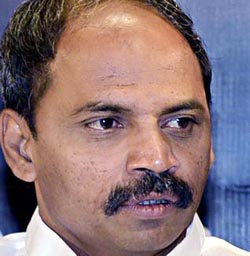Bangalore, Apr 29: A team of Medical Council of India will visit six new government medical colleges in Karnataka for inspection in a week's time to take stock of facilities available for medical students, Medical Education Minister Sharan Prakash R Patil said today.
The team would visit the colleges at Gulbarga, Koppal, Chamrajnagar, Karwar, Madikeri and Gadag, he told reporters here.
The state government is unable to increase the quota of medical seats in its pool as MCI is yet to inspect the six new medical colleges, Patil said. The government will try its best to get the MCI nod for the new colleges, he added.
The recruitment process for the new medical colleges has already begun and infrastructure work is underway, Patil said.
The government is also committed to set up six more medical colleges as announced in this year's state budget, he said. The colleges will be set up in Tumkur, Chitradurga, Chickballapur, Bagalkot, Haveri and Yadgir, Patil said.
Besides, the government plans to set up super-speciality hospitals in Mysore, Hubli, Gulbarga, Belgaum and Bellary to make healthcare affordable.
Lands have been identified in all these districts, except Yadgir and Chickballapur. "We have directed the deputy commissioners of these two districts to identify the land," he added.
These colleges will be established in collaboration with the Rajiv Gandhi University of Health Sciences, Patil said.




Comments
This post is worth everyone's attention. How can I find out more?
Feel free to visit my website :: finasteride 5mg: http://www.hhgghy.com/comment/html/index.php?page=1&id=49677
Add new comment